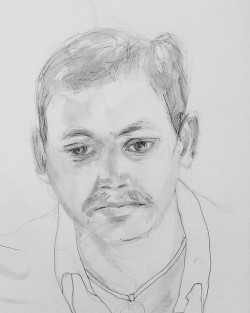by Antara Roy Oruganti
Santu was barely into adulthood. His face had the freshness and innocence of a child. He was tall and lean, and on this childlike face, grew traces of a beard, and yet, within him he carried the heart of a child. That Sunday morning, he had bid goodbye to his family and the people in his village. He had seen them disappear in a cloud of dust as the bus made its way on the muddy path. His neck ached from looking behind at them, but the goodbye still didn’t felt complete. Maybe, he thought, goodbyes never feel complete because you always leave a part of yourself with the people you are bound to.
It was Monday morning, and Santu had appeared for his first day at work. He was awed by the big city: how immense and endless it was, how easy it was to feel lost and homeless in. Overwhelmed by the vastness and the new, frantic energy, Santu held on to the memories of his village: the forest by the old, deep well; the lush, green rice fields, so green in the morning sun that your heart warmed and basked in it for hours; the call of the birds…
Coo coo coo coo…
Every memory echoed like a song, reverberating in his veins. He felt he had never really left the village. This new, big city must really be a dream.
He quietly sat digging at his breakfast; idli and sambar. He barely paid attention to what he was eating; for all he knew, he may have been eating twigs and stones. It was the very first morning in his life when he was having breakfast alone, away from his people. He looked out of the window, cars and motorcycles whizzed by. How insensitive, thought Santu! How insensitive that the world here moved on, like nothing had happened, and these cars raced by, without paying a heed to his grief!
Santu! Come here, quick, she may be hiding here! Deuta will teach her a good lesson.
His sister Moina’s voice rang in his ears. Santu had taken everything for granted. Chasing the cat and the chickens; pulling the tail of their cow, Lakshmi; shaking the raw papaya fruit and listening to the sound of the seeds jingling inside. All these were everyday miracles, exploring the magic of the earth, together with Moina; he had never, for once, doubted that all of this would not last forever. His life in the village seemed eternal, beyond the cruel grasp of time and necessities.
And then slowly, Deuta had to sell a portion of the land to meet the growing needs of the family. And then, it was time for Lakshmi to go, and then, one day, it was time for him to go. It all seemed to happen so suddenly, even though Deuta had been talking about it for months. Talking about sending Santu to the city to earn some money for the family back in the village. Santu had heard it all and paid no heed to it. In his mind, it was an impossible event; to leave the village, to leave Moina, her sweet, honey-soaked voice that played like music in his world by the rice fields.
Santu! Come, quickly! Where have you disappeared? I found her. She’s hiding here, see there, in the middle of all those blades of grass!
Santu struggled with a stiff, short breath, and helplessly watched a tear drop into his plate of idlis and sambar. He felt defeated with himself, as though it was shameful to cry, as though he was letting himself down by allowing that tear into the world. He hurriedly finished his breakfast and rose from his chair. He had to meet the manager of the hotel. It was his first day at work.
It was relieving to meet the manager, at last. At least there was someone he knew in this vast and alien city.
‘Oh, there you are Santu! Come now, I will quickly brief you on your responsibilities, and remember, the most important thing is to be sweet and polite, and always be ready to help the customer. OK?’
‘Yes, sir.’
‘What is this? What’s with your face? You look like Devdas. Come now, wear a smile on your face. Remember, you are in the hospitality business.’
‘Yes, sir.’
Santu forced a smile over his anguished features. It was the hardest thing he had ever done. Once the manager was out of his sight, Santu swallowed up his fake smile, and wondered how he would get by the whole day.
He put on his new work clothes. A checked shirt with a tuxedo, and black trousers, and a black coat. He stood in front of the mirror, and looked at himself. He imagined Moina laughing at him, laughing at his new clothes. For a moment, he felt relieved that she was not here to see him in these strange, new clothes.
It was time to go to work, and, put on a smile.
The restaurant was spacious, and Santu was amazed with the intricately decorated interiors. But there seemed to be no one around, and Santu looked out of the window. The sun streamed down with a fierce brightness. Not a leaf on the trees stirred.
Santu! Come, now, where are you? Are you also hiding like this mischievous cat?
His thoughts were interrupted by the rustle of a dress and soft footsteps. Santu looked back and noticed a lady walking across the tables. She was tall and slender and wore a light brown dress that reached up to her ankles. Her hair was the colour of hay, and her eyes, the blue of a river. Her skin was pale, but when she smiled, it glowed with a soft hue.
‘Excuse me!’ she called softly.
Santu noticed that her eyes were puffed up and red. She had been crying.
‘Yes, Ma’am!’ He tried to put on a smile.
‘Ah! Yes!’ she said, and then, ‘I’m so sorry, excuse me!’ She pulled out a handkerchief from her bag, and blew her nose into it.
She fell quiet again, still running her eyes over the menu.
‘Umm,’ she pointed out to an item in the menu. ‘How do you pronounce this?’
‘Paneer makhani, Ma’am.’
‘Pae-nir maekhaenee,’ she said in her thick accent. Her lips and tongue rollicked and rolled, and the sounds that came out were musical and amusing to Santu’s ears.
‘And what’s this?’ she asked.
‘That is puliogere, Ma’am. Rice prepared with tamarind and spices.’
‘Oh! I’d love to try that! What did you say it was?’
‘Puliogere, Ma’am.’
‘Pull…pull…geare!’
‘Pu-lio-ge-re,’ said Santu, in a slow rhythmic voice.
‘Pul..pul….,’ she laughed. ‘Oh, well!’
Santu smiled.
When the tamarind rice was ready, he eagerly served it to her and watched as she carefully rolled the syllables in her mouth, like a gymnast balancing on a beam.
‘Pu-lio-gere…Pu-lio-gere! See I got it!’
They looked into each other’s eyes and smiled. Santu felt that if they had continued smiling and looking into each other’s eyes any longer, they may have burst into tears. He thought about how close such small, brief intermittent joys were to the larger sorrows that we felt. Perhaps she was away from her home too. Perhaps she missed her people too.
He gently moved away and let her enjoy her meal at peace. And his heart felt – perhaps not much, but a little – lighter from the brief encounter with this childlike, sweet-tempered stranger.
And then more and more people appeared, as though from inside some secret cave. Santu was on his feet for the next few hours. He felt like a streak of lightning, flashing in and out of the kitchen; taking orders, serving food, exchanging courtesies. There was no time to look out of the window, there was no time to ruminate about the past.
That night when he was alone in his room, Santu looked at the window curtain and the patterns cast on it by the play of light and shadow from the street. His new world enveloped him; new sounds came to make friends with his ears. And, then, slowly his eyes felt weary, and the sounds of the old and the new began to mingle into one another….
Santu, where are you? Oh, please! If you don’t appear, I’ll tell Deuta to not let you have fish today. No fish, for you and the cat!
No fish, for you and the cat!
No fish, for you and the…
Perhaps, one day, soon enough, he will learn to listen to the music of the big city.
Picture credit: https://www.flickr.com/photos/alainmarcus/






